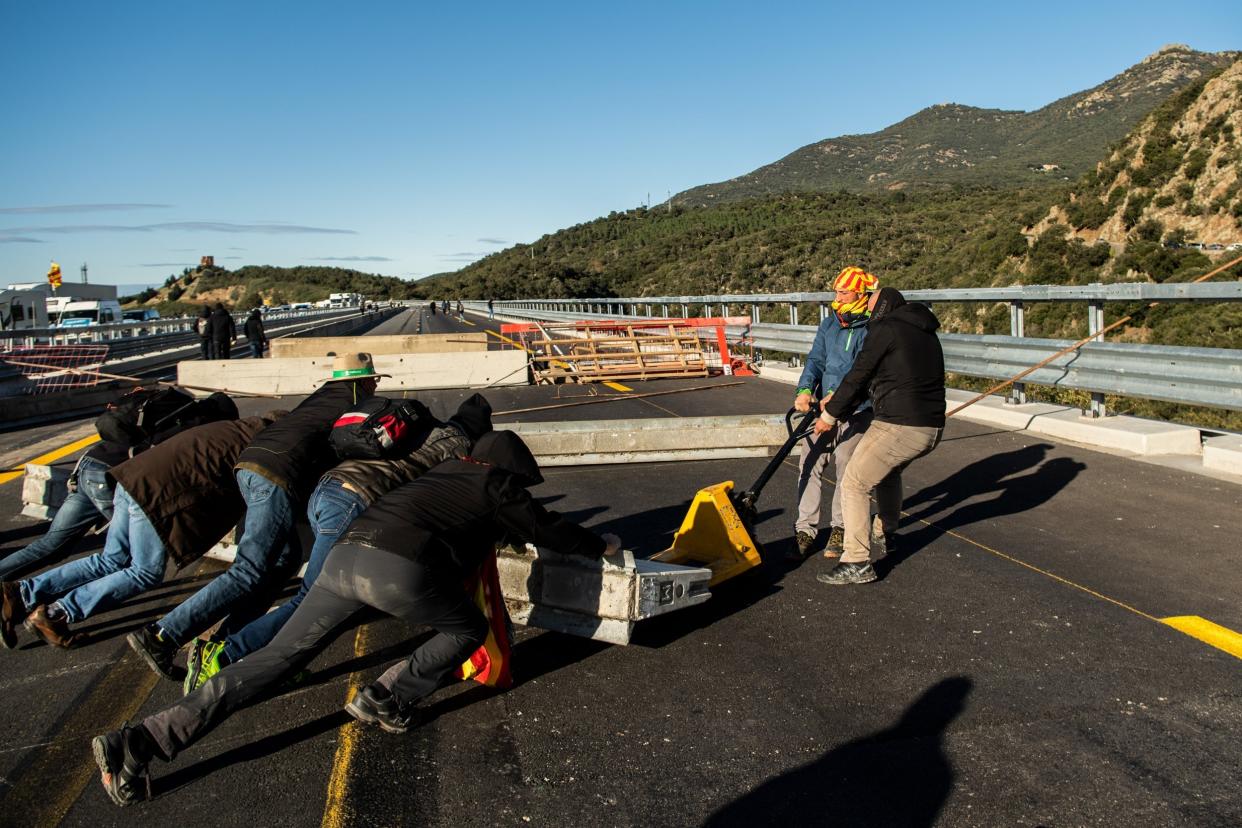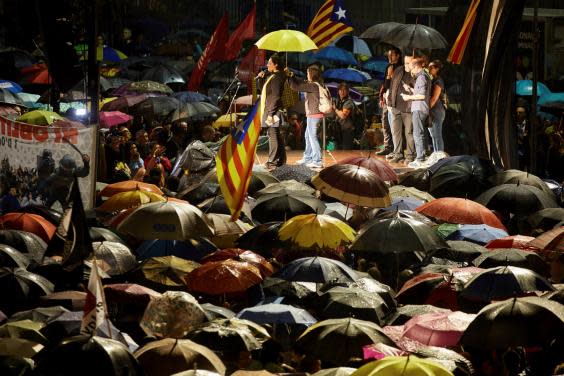‘Prison has become a loudspeaker’: Catalan independence activists are undeterred by arrests

When Jordi Cuixart was sentenced by Spain’s Supreme Court in October, his son was only three weeks old. If he serves the full term for his part in Catalonia’s independence referendum, the child will be seven when he is eventually freed.
That thought would drive many fathers to despair, but Cuixart – who was granted six hours’ leave from pre-trial detention to attend the birth – is in high spirits, confident his incarceration will serve the greater good.
“I’m in no rush to leave,” Cuixart tells The Independent from Lledoners prison near the city of Manresa, around 45 minutes from Barcelona.
Instead, he says he wants to leave jail with “the peace of mind that I’ve done my duty”. He and the eight other jailed independence leaders plan to claim amnesty, though Cuixart says: “I’m never going to beg for pardon for exercising fundamental rights.
“I am not a politician in prison, I am a political prisoner who uses jail to denounce Spain’s human rights violations.
“Prison has simply become a loudspeaker.”
Cuixart’s optimism reflects a renewed confidence among independentistas, or Catalan separatist activists.
Despite the violence that has scarred the region in recent weeks, secessionist parties have just achieved their best-ever result in Spain’s national elections.
The three pro-independence parties – the Republican Left, Together for Catalonia and the Popular Unity Candidacy (CUP) – gained 42.59 per cent of the congressional vote, 3 per cent more than their previous best performance in April. They now control 23 of Catalonia’s 48 seats, another all-time high.
As results came in last weekend, supporters could barely hide their excitement.
Maria del Carmen Lleo, a Red Cross worker campaigning for Together for Catalonia in central Barcelona, tells The Independent the results promise “a great advance”.
“This is a cause for reflection for the whole of Spain,” she continues, “as well as the international community, that this is not an illusion. There really is a significant majority in Catalonia that wants their own state.”

Ferran Riera, who was campaigning for the CUP, goes even further. “The independence movement is now unstoppable,” he says, “and it’s only getting bigger.”
The elections came just weeks after Spain’s Supreme Court condemned Cuixart and eight other independence figureheads to a combined 99 years’ incarceration for sedition and misuse of public funds.
To loyalists, the leaders were justly punished for forcing independence on a region which had never shown a clear majority in its favour. They believe Cuixart and his comrades brainwashed the Catalan people by imposing the regional language on schoolchildren and siphoned taxpayers’ money to fund their propaganda. Despite all this pressure, they add, support for independence is still well short of 50 per cent, a point backed up by various recent opinion polls.
To separatists, however, the jailed figureheads have become martyrs, symbols of Madrid’s relentless subjugation. This point was echoed by voters who spoke to The Independent at the polling booths.
One, Itziar Santiago, noted that “what they achieved with the judicial verdict was to infuriate us to such an extent that many people decided it wasn’t enough to simply go out on the street, as many had done up until then.
“When you realise that the other side are only going to give you trials and repression, you decide that smiles aren’t sufficient. They’ve provoked, humiliated and trampled on us, thinking that imprisoning the leaders would frighten us and make us return to our day-to-day lives.
“What they’ve found is that ordinary people don’t fear them anymore and that we’re not going to let them trample on us anymore. Many drops of water form a great wave.”
The Supreme Court verdict led to week-long clashes across Barcelona, which left 600 people injured and prompted outrage across the rest of the country.
In a recent op-ed published in around 20 outlets, Spain’s newly re-elected prime minister, Pedro Sanchez, described Catalan separatism as a challenge for the whole of Europe.
Despite the backlash, however, protests have continued unabated – albeit with a noticeably less belligerent tone.
Omnium Cultural, the Catalan association Cuixart leads, has run a campaign calling for separatists to turn themselves in at police stations, in solidarity with those jailed.
In parallel, a series of civil disturbances have been led by activist group Democratic Tsunami, which has even created an app to organise meetings.
Last week Tsunami blockaded the border between Spain and France for two days as well as barricading several roads in Barcelona.

The action sparked fresh uproar, with Spain’s transport confederation suggesting their members lost around €15m (£12.85m). In a damning article in Catalonia’s La Vanguardia newspaper, one trucker likened the situation to a “hijacking”.
However, Quim Torra, Catalonia’s pro-independence president, played down the criticism by suggesting “this country guarantees the right to protest”.
Torra’s stance was reflected by protesters at the scene who insist their actions are strictly non-violent. Any flashpoints, they say, are caused by outside infiltrators.
Maria Jose Chacon, a councillor with Together for Catalonia in Barcelona, travelled for around seven hours to attend Monday’s border blockade. She says that “in the days after the sentence I believe some demonstrators weren’t from here. I had to go down to rescue my scooter [from being burnt] and heard people who didn’t speak Catalan or Spanish.
“But all protests organised by Catalan people are peaceful. We all help one another. If it’s ever necessary for an ambulance to pass, we make our own cordon, and we always have medical workers on hand. We’ve had constructive conversations with the police.
“It’s true there might be some collateral damage for transport workers, but we’re working towards a better future for everyone.”
Chacon, who has attended 14 demonstrations and hopes to join Omnium’s self-incrimination campaign, has two teenage sons and says she has had to make a number of sacrifices.
But she adds that “between my partner and I we organise ourselves. It’s true I’m missing time with them but I’m thinking about their future, too. These are efforts you have to make.”
In addition to the motorway blockade, the movement has come under fire for a string of recent pro-independence students demonstrations, which left several universities paralysed for days.
One of those locked out during the university blockade was Nacho Miret, a spokesperson for S’ha Acabat (It’s Over), a pro-Spain youth group that opposes hardline separatism.
“We’re not against demonstrations, provided they don’t cut the rights and liberties of everyone,” he tells The Independent.
“But that’s what we’ve seen recently, both in the universities and the street.
“The false mantra of Spanish state repression has to be stopped. Liberty and tolerance must be defended. That’s why we have to say, ‘Enough now’.”
But independence activists are unbowed.
“As a civil society, our task is to pressure governments into democratic changes,” says Cuixart.
“The cause of self-determination in Catalonia is no different to other citizen causes that fight for a fairer, more democratic future, as we’ve seen in Chile, Lebanon and Hong Kong.
“The only thing the state’s repression achieves is to strengthen our democratic convictions.”
Read more
Catalonia independence referendum one year on, how do things look now?
Pedro Sánchez should take blame for the rise of the far right in Spain
Divided over a dictator, Spain exhumes Franco’s remains
Spain’s prime minister criticised for refusing to meet Catalan leaders

 Yahoo News
Yahoo News 
